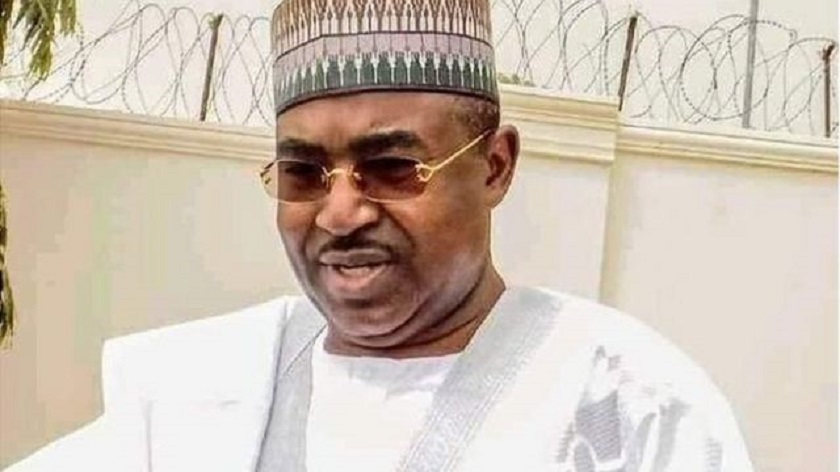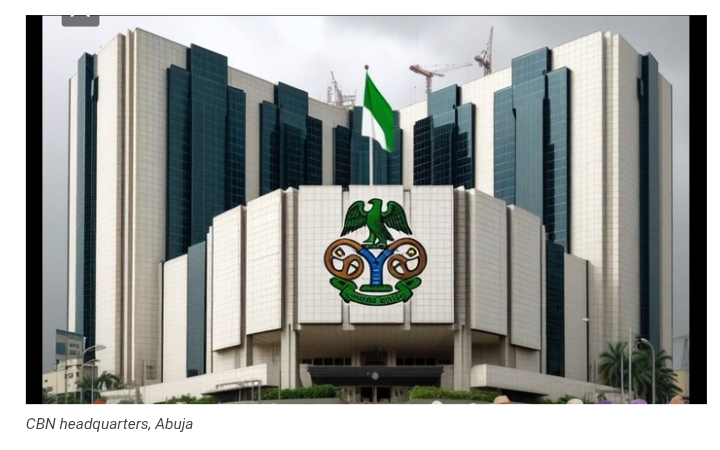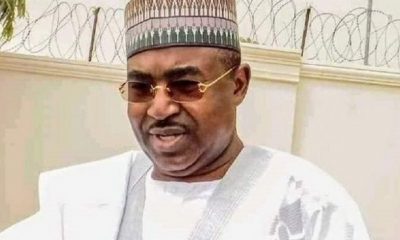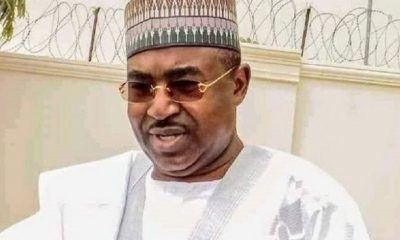Feature/OPED
Marwa’s Creative Fights Against Illicit Drugs in Nigeria

By Jerome-Mario Utomi
I still recall with vividness how in the year 2008, Nigeria and most Nigerians breathed a sigh of relief as the country was certified by the United States of America (USA) as cooperating in the anti-narcotics crusade for the eighth successive time in 2008, with George Bush, the former President of the US, noting that Nigeria had made significant progress in the counter-narcotics war and had effectively co-operated with the United States on drug-related and money laundering cases.
Although he (Bush) was saying the obvious, and, majority of Nigerians thought that the nation was winning the war against drug trafficking, to Nigerians with critical minds, it was very doubtful if the National Drug Law Enforcement Agency (NDLEA) will sustain that record as nobody within the leadership did anything to institutionalize such performance.
Apart from this challenge, the agency then also wore the crest of an underfunded body and was reputed as infamous for the poor manpower it earned from a long period of neglect by previous administrations.
As expected, such euphoria elicited by United States certification was short-lived as events and reports on the nation’s effort in this direction suddenly nosedived unabated.
This negative leadership trend continued until very recently when the former military administrator of Lagos and Borno States, Mr Mohammed Buba Marwa, was in January 2021 appointed as the substantive Chairman/CEO of the NDLEA by President Muhammadu Buhari.
Before the appointment, Marwa had worked as Chairman of the Presidential Advisory Committee for the Elimination of Drug Abuse (PACEDA) between 2018 and December 2020, along with others to develop a blueprint on how to end drug abuse in Nigeria.
Today, I cannot categorically say that all is perfectly well for the nation in its efforts to liberate its citizens from trading on, consumption of or effects of illicit drugs.
But looking at the present instinct in the country, and exciting progress in this direction, particularly the recent declaration by the head of the agency that N6 billion worth of drugs meant for insurgents were intercepted at the Apapa Port in Lagos State, the situation explains something new and different.
But before then, this piece will add context to the present discourse.
From available records, the fight against drug abuse in the country has been on for a very long time and is backed by so many federal laws.
In fact, it dates back to as far back as 1935. Some of the most important laws against the cultivation, trafficking and abuse of illicit drugs in Nigeria are as follows;
The Dangerous Drugs Ordinance of 1935 enacted by the British Colonial administration, the Indian hemp Decree No. 19 of 1966, the Indian hemp (Amendment) Decree No. 34 of 1979, the Indian Hemp (Amendment) Decree and the Special Tribunal (Miscellaneous Offences) Decree No. 20 of 1984, the Special Tribunal (Miscellaneous Offences) (Amendment) Decree of 1986 and the National Drug Law Enforcement Agency Decree No. 48 of 1989 (as amended by Decree No.33 of 1990, Decree No 15 of 1992 and Decree No. 62 of 1999).
These laws were harmonized as an Act of the parliament, CAP N30 Laws of the Federation of Nigeria (LFN) 2004. This Act established the NDLEA.
But regrettably, these legions of laws neither appreciably provided an effective and efficient strong source of solution to illicit consumption of drugs in the country nor provided useful frameworks comprehensive enough to offer legal solutions to the issues of drug trafficking or its enforcement.
However, presently, with Marwa’s leadership, the country has against all known logic become visibly unsafe for both illicit drug peddlers and consumers. It is no longer business as usual.
Also characterizing Marwa’s administration as exemplary is his being integrated with the approach. He is not class-specific. His recent advocacy/enlightenment campaigns of school children about the harmful effects involving drug abuse and persistent emphasis that those seeking public offices in Nigeria go through harmful drug-related tests are but perfect examples to this claim/assertion.
Comparatively, like the Sustainable Development Goals (SDGs) Goal 3 which is targeted at “ensuring healthy lives and promote well-being for all at all ages, even so, has the NDLEA developed a sustainable National Drug Control Master Plan (NDCMP) that views illicit drugs from the perspective of public health and education issues while providing a balanced solution to the drug scourge.
Extensively, there are in fact more pragmatic reasons why the nation must join hands with the Marwa led administration to stamp out the proliferation of illicit drugs in the country.
First is that many lives, going by commentaries have before been destroyed as a result of drugs. Many are in psychiatric wards. Many have died. Many have lost their jobs and many have lost their homes.
Qualifying the development as a reality to worry about is that, according to the World Drug Report, released by the United Nations Office on Drugs and Crime (UNODC), June 26, 2019, stated that about 35 million people are estimated to suffer from drug use disorders and who require treatment services.
With this revelation, it is evident that the consumption of drugs in amounts and methods not authorized by medical professionals has presently become the greatest killer of humanity. And perfectly characterize as correct the recent claim/statement by President Buhari that the danger posed to the country by illicit drugs was worse than those of insurgency, banditry and other threats to the stability of the country.
“Let me say that this war is more deadly than the insurgency we have in the north-eastern part of the country or the acts of banditry in the northwest or the acts of kidnapping that transcends all the geopolitical zones of this country because it is a war that is destroying three generations because I’ve seen clips of where grandparents are on drugs, parents are on drugs, and by extension, their wards, their children are on drugs’.
That is not the only danger.
A 2018 survey report on drug use in Nigeria by the National Survey on Drug Use and Health conducted by the National Bureau of Statistics (NBS) and the Centre for Research and Information on Substance Abuse (CRISA) with technical support from the United Nations Office on Drugs and Crime (UNODC), and funded by the European Union (EU) under the 10th European Development Fund (EDF) in, “Response to Drugs and Related Organized Crime in Nigeria, among other things, observed; that the past year prevalence of any drug use in Nigeria is estimated at 14.4 per cent or 14.3 million people aged between 15 and 64 year and high when compared with the 2016 global annual prevalence of any drug use of 5.6 per cent among the adult population.
In the same vein, World Drug Report 2018 indicated also that psychoactive substances excluding alcohol, overall was higher among men in Nigeria, Drug users the report added was most common among those who were between the ages of 25 and 39 years, while the rates of past-year use were lowest among those who were below 24 years of age. Cannabis was the most commonly used drug followed by opioids, mainly the non-medical use of prescription opioids and cough syrup.
This is not by any means a good commentary. Yet, the situation says something else.
It was also revealed that living with an active drug abuser –for example, a husband automatically makes the wife a passive substance abuser, of which the adverse effect resulting from such an arrangement in most cases appears more pronounced on the passive abuser.
Away from impact to the physical dependence, the mountain of evidence suggests that the person using a drug over a period of time would have developed an intense reliance on drugs, often to avoid difficult withdrawal symptoms. The person will often crave (strong desire) to use the drugs despite the damaging consequences to their physical, mental and social wellbeing.
Drug users can also experience psychological dependence in which they believe it is necessary to use a drug to function sometimes just at social gatherings or all the time.
This challenge from what experts are saying is further nourished by our not being ready as a nation to confront the underlying cause(s) of drug dependency and other associated behaviours.
Our unwillingness to collectively assist the abusers to focus on un-learning such negative behaviours and in its place develop the required skills and positive attitudes to achieve a drug-free society is currently preached the world over exacerbates the challenge.
Very regrettably, in abandoning this responsibility, one fact we fail to remember is that drug dependence is not based on a personal weakness or lack of morals on the part of the abuser but a chronic relapsing medical condition- a reality that, in my opinion, qualifies these people for our love and not vilification or abandonment.
For a better understanding of the plights of the abusers, we must begin to imagine what it would look like if those drug abusers were to be from our families. We can imagine ourselves participating in the funerals of our dear ones that passed on, no thanks to substance abuse.
Sincerely, our failure to love and care for these drug addicts in our society, make us more socially sick than the abusers.
But then, Nigerians must pray and support Mohammed Buba Marwa’s quest to defeat the proliferation of illicit drugs in Nigeria.
Jerome-Mario Utomi is the Programme Coordinator (Media and Public Policy), Social and Economic Justice Advocacy (SEJA), Lagos. He could be reached via je*********@***oo.com/08032725374.
Feature/OPED
Brent’s Jump Collides with CBN Easing, Exposes Policy-lag Arbitrage

Nigeria is entering a timing-sensitive macro set-up as the oil complex reprices disruption risk and the US dollar firms. Brent moved violently this week, settling at $77.74 on 02 March, up 6.68% on the day, after trading as high as $82.37 before settling around $78.07 on 3 March. For Nigeria, the immediate hook is the overlap with domestic policy: the Central Bank of Nigeria (CBN) has just cut its Monetary Policy Rate (MPR) by 50 basis points to 26.50%, whilst headline inflation is still 15.10% year on year in January.
“Investors often talk about Nigeria as an oil story, but the market response is frequently a timing story,” said David Barrett, Chief Executive Officer, EBC Financial Group (UK) Ltd. “When the pass-through clock runs ahead of the policy clock, inflation risk, and United States Dollar (USD) demand can show up before any oil benefit is felt in day-to-day liquidity.”
Policy and Pricing Regime Shift: One Shock, Different Clocks
EBC Financial Group (“EBC”) frames Nigeria’s current set-up as “policy-lag arbitrage”: the same external energy shock can hit domestic costs, FX liquidity, and monetary transmission on different timelines. A risk premium that begins in crude can quickly show up in delivered costs through freight and insurance, and EBC notes that downstream pressure has been visible in refined markets, with jet fuel and diesel cash premiums hitting multi-year highs.
Market Impact: Oil Support is Conditional, Pass-through is Not
EBC points out that higher crude is not automatically supportive of the naira in the short run because “oil buffer” depends on how quickly external receipts translate into market-clearing USD liquidity. Recent price action illustrates the sensitivity: the naira was quoted at 1,344 per dollar on the official market on 19 February, compared with 1,357 a week earlier, whilst street trading was cited around 1,385.
At the same time, Nigeria’s inflation channel can move quickly even during disinflation: headline inflation eased to 15.10% in January from 15.15% in December, and food inflation slowed to 8.89% from 10.84%, but energy-led transport and logistics costs can reintroduce pressure if the risk premium persists. EBC also points to a broader Nigeria-specific reality: the economy grew 4.07% year on year in 4Q25, with the oil sector expanding 6.79% and non-oil 3.99%, whilst average daily oil production slipped to 1.58 million bpd from 1.64 million bpd in 3Q25. That mix supports external-balance potential, but it also underscores why the domestic liquidity benefit can arrive with a lag.
Nigeria’s Buffer Looks Stronger, but It Does Not Eliminate Sequencing Risk
EBC sees that near-term external resilience is improving. The CBN Governor said gross external reserves rose to USD 50.45 billion as of 16 February 2026, equivalent to 9.68 months of import cover for goods and services. Even so, EBC views the market’s focus as pragmatic: in a risk-off tape, investors tend to price the order of transmission, not the eventual balance-of-payments benefit.
In the near term, EBC expects attention to rotate to scheduled energy and policy signposts that can confirm whether the current repricing is a short, violent adjustment or a more durable regime shift, including the U.S. Energy Information Administration (EIA) Short-Term Energy Outlook (10 March 2026), OPEC’s Monthly Oil Market Report (11 March 2026), and the U.S. Federal Reserve meeting (17 to 18 March 2026). On the domestic calendar, the CBN’s published schedule points to the next Monetary Policy Committee meeting on 19 to 20 May 2026.
Risk Frame: The Market Prices the Lag, Not the Headline
EBC cautions that outcomes are asymmetric. A rapid de-escalation could compress the crude risk premium quickly, but once freight, insurance, and hedging behaviour adjust, second-round effects can linger through inflation uncertainty and a more persistent USD bid.
“Oil can act as a shock absorber for Nigeria, but only when the liquidity channel is working,” Barrett added. “If USD conditions tighten first and domestic pass-through accelerates, the market prices the lag, not the headline oil price.”
Brent remains an anchor instrument for tracking this timing risk because it links energy-led inflation expectations, USD liquidity, and emerging-market risk appetite in one market. EBC Commodities offering provides access to Brent Crude Spot (XBRUSD) via its trading platform for following energy-driven macro volatility through a single instrument.
Feature/OPED
Gen Alpha: Africa’s Digital Architects, Not Your Target Audience

By Emma Kendrick Cox
This year, the eldest Gen Alpha turns 16.
That means they aren’t just the future of our work anymore. They are officially calling for a seat at the table, and they’ve brought their own chairs. And if you’re still calling this generation born between 2010 and 2025 the iPad generation, then I hate to break it to you, but you’re already obsolete. To the uninitiated, they look like a screen-addicted mystery. To those of us paying attention, they are the most sophisticated, commercially potent, and culturally fluent architects Africa has ever seen.
Why? Because Alphas were not born alongside the internet. They were born inside it. And by 2030, Africa will be home to one in every three Gen Alphas on the planet.
QWERTY the Dinosaur
We are witnessing the rise of a generation that writes via Siri and speech-to-text before they can even hold a pencil. With 63% of these kids navigating smartphones by age five, they don’t see a QWERTY keyboard as a tool. They see it as a speed bump, the long route, an inefficient use of their bandwidth. They don’t need to learn how to use tech because they were born with the ability to command their entire environment with a voice note or a swipe.
They are platform agnostic by instinct. They don’t see boundaries between devices. They’ll migrate from an Android phone to a Smart TV to an iPhone without breaking their stride. To them, the hardware is invisible…it’s the experience that matters.
They recognise brand identities long before they know the alphabet. I share a home with a peak Gen Alpha, age six and a half (don’t I dare forget that half). When she hears the ding-ding-ding-ding-ding of South Africa’s largest bank, Capitec’s POS machine, she calls it out instantly: “Mum! Someone just paid with Capitec!” It suddenly gives a whole new meaning to the theory of brand recall, in a case like this, extending it into a mental map of the financial world drawn long before Grade 2.
And it ultimately lands on this: This generation doesn’t want to just view your brand from behind a glass screen. They want to touch it, hear it, inhabit it, and remix it. If they can’t live inside your world, you’re literally just static.
The Uno Reverse card
Unlike any generation we’ve seen to date, households from Lagos to Joburg and beyond now see Alphas hold the ultimate Uno Reverse card on purchasing power. With 80% of parents admitting their kids dictate what the family buys, these Alphas are the unofficial CTOs and Procurement Officers of the home:
-
The hardware veto: Parents pay the bill, but Alphas pick the ISP based on Roblox latency and YouTube 4K buffers.
-
The Urban/Rural bridge: In the cities, they’re barking orders at Alexa. In rural areas, they are the ones translating tech for their families and narrowing the digital divide from the inside out.
-
The death of passive: I’ll fall on my sword when I say that with this generation, the word consumer is dead. It implies they just sit there and take what you give them, when, on the contrary, it is the total opposite. Alphas are Architectural. They are not going to buy your product unless they can co-author the experience from end to end.
As this generation creeps closer and closer to our bullseye, the team here at Irvine Partners has stopped looking at Gen Alpha as a demographic and started seeing them as the new infrastructure of the African market. They are mega-precise, fast, and surgically informed.
Believe me when I say they’ve already moved into your industry and started knocking down the walls. The only question is: are you building something they actually want to live in, or are you just a FaceTime call they are about to decline?
Pay attention. Big moves are coming. The architects are here.
Emma Kendrick Cox is an Executive Creative Director at Irvine Partners
Feature/OPED
Why Digital Trust Matters: Secure, Responsible AI for African SMEs?

By Kehinde Ogundare
For years, security for SMEs across sub-Saharan Africa meant metal grilles and alarm systems. Today, the most significant risks are invisible and growing faster than most businesses realise.
Artificial Intelligence has quietly embedded itself into everyday operations. The chatbot responding to customers at midnight, the system forecasting inventory requirements, and the software identifying unusual transactions are no longer experimental technologies. They are becoming standard features of modern business tools.
Last month’s observance of Safer Internet Day on February 10, themed ‘Smart tech, safe choices’, marked a pivotal moment. As AI adoption accelerates, the conversation must shift from whether businesses should use AI to how they deploy it responsibly. For SMEs across Africa, digital trust is no longer a technical consideration. It is a strategic business imperative.
The evolving threat landscape
Cybersecurity threats facing sub-Saharan African SMEs have moved well beyond basic phishing emails. Globally, cybercrime costs are projected to reach $10.5 trillion this year, fuelled by generative AI and increasingly sophisticated social engineering techniques. Ransomware attacks now paralyse entire operations, while other threats quietly extract sensitive customer data over extended periods.
The regional impact is equally significant. More than 70% of South African SMEs report experiencing at least one attempted cyberattack, and Nigeria faces an average of 3,759 cyberattacks per week on its businesses. Kenya recorded 2.54 billion cyber threat incidents in the first quarter of 2025 alone, whilst Africa loses approximately 10% of its GDP to cyberattacks annually.
The hidden risk of fragmentation
A common but often overlooked vulnerability lies in digital fragmentation.
In the early stages of growth, SMEs understandably prioritise affordability and agility. Over time, this can result in a patchwork of disconnected applications, each with separate logins, security standards, and privacy policies. What begins as flexibility can involve operational complexity.
According to IBM Security’s Cost of a Data Breach Report, companies with highly fragmented security environments experienced average breach costs of $4.88 million in 2024.
Fragmented systems create blind spots; each additional data transfer between applications increases exposure. Inconsistent security protocols make governance harder to enforce. Limited visibility reduces the ability to detect anomalies early. In practical terms, complexity increases risk.
Privacy-first AI as a competitive differentiator
As AI capabilities become embedded in business software, SMEs face a choice about how they approach these powerful tools. The risks are not merely theoretical.
Consumers across Africa are becoming more aware of data rights and are willing to walk away from businesses that cannot demonstrate trustworthiness. According to KPMG’s Trust in AI report, approximately 70% of adults do not trust companies to use AI responsibly, and 81% expect misuse. Meanwhile, studies also show that 71% of consumers would stop doing business with a company that mishandles information.
Trust, once lost, is difficult to rebuild. In the digital age, a single data leak can destroy a reputation that took ten years to build. When customers share their payment details or purchase history, they extend trust. How you handle that trust, particularly when AI processes their data, determines whether they return or take their business elsewhere.
Privacy-first, responsible AI design means building intelligence into business systems with data protection, transparency and ethical use embedded from the outset. It involves collecting only necessary information, storing it securely, being transparent about how AI makes decisions, and ensuring algorithms work without compromising customer privacy. For SMEs, this might mean choosing inventory software where predictive AI runs on your own data without sending it externally, or customer service platforms that analyse patterns without exposing individual records. When AI is built responsibly into unified platforms, it becomes a competitive advantage: you gain operational efficiency whilst demonstrating that customer data is protected, not exploited.
Unified platforms and operational resilience
The solution lies in rethinking digital infrastructure. Rather than accumulating disparate tools, businesses need unified platforms that integrate core functions whilst maintaining consistent security protocols.
A unified approach means choosing cloud-based platforms where functions share common security standards, and data flows seamlessly. For a manufacturing SME, this means inventory management, order processing and financial reporting operate within a single security framework.
When everything operates cohesively, security gaps diminish, and the attack surface shrinks. And the benefits extend beyond risk reduction: employees spend less time on administrative friction, customer data stays consistent, and platforms enable secure collaboration without traditional infrastructure costs.
Safer Internet Day reminds us that the digital world requires active stewardship. For SMEs across the African continent who are navigating complex threats whilst harnessing AI’s potential, digital trust is foundational to sustainable growth. Security, privacy and responsible AI are essential characteristics of any technology infrastructure worth building upon. Businesses that embrace unified, privacy-first platforms will be more resilient against cyber threats and better positioned to earn and maintain trust. In a market where trust is currency, that advantage is everything.
Kehinde Ogundare is the Country Head for Zoho Nigeria
-

 Feature/OPED6 years ago
Feature/OPED6 years agoDavos was Different this year
-
Travel/Tourism10 years ago
Lagos Seals Western Lodge Hotel In Ikorodu
-

 Showbiz3 years ago
Showbiz3 years agoEstranged Lover Releases Videos of Empress Njamah Bathing
-

 Banking8 years ago
Banking8 years agoSort Codes of GTBank Branches in Nigeria
-

 Economy3 years ago
Economy3 years agoSubsidy Removal: CNG at N130 Per Litre Cheaper Than Petrol—IPMAN
-

 Banking3 years ago
Banking3 years agoSort Codes of UBA Branches in Nigeria
-

 Banking3 years ago
Banking3 years agoFirst Bank Announces Planned Downtime
-

 Sports3 years ago
Sports3 years agoHighest Paid Nigerian Footballer – How Much Do Nigerian Footballers Earn

















